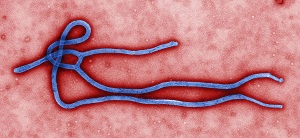 |
| Ebolavirus under an electron microscope--Courtesy of CDC |
Two experimental antivirals are about to undergo snap clinical trials in Africa as doctors scramble to find an effective remedy for the lethal outbreak of Ebola. Doctors Without Borders says that it plans to launch studies of brincidofovir from Chimerix ($CMRX) as well as Fujifilm's favipiravir.
The nonprofit group plans to launch the studies next month with results available as early as February 2015. And they plan to respond quickly to any signs of progress, including adapting the trials to include combination treatments. So far the Ebola virus has killed more than 5,000 people in West Africa.
The University of Oxford will lead the Wellcome Trust-funded brincidofovir study while the French National Institute of Health and Medical Research will manage a trial using favipiravir in Guéckédou, Guinea. The Antwerp Institute of Tropical Medicine will lead a trial of convalescent whole blood and plasma therapy at the Donka Ebola centre in Conakry, Guinea.
"These three trials are part of the first phase of a research aimed at finding the best treatment to cure patients with Ebola," said Professor Denis Malvy, who will lead one of the trials in Guinea. "The three trial boards will therefore be coordinated in a very reactive way, so that any new fact can be discussed rapidly and our research plans can be adapted accordingly. Strengthening the link between our teams is all the more important as there is the possibility that, should our trials give positive results, the next phase could consist of combining interventions."
Fujifilm's antiviral, which halts viral gene replication, has already been used to successfully treat four Ebola patients, spurring new studies of the antibody cocktail and a plan to gain an emergency approval sometime next year. The treatment is already approved in Japan and is in the final stages of gaining an approval as a flu therapy in the U.S.
Durham, NC-based Chimerix, meanwhile, is pursuing its own rushed Phase II study aimed at healthcare workers infected with the Ebola virus. In recent weeks the biotech has added details on its study design listed on clinicaltrials.gov. The trial calls for 50 patients aged 2 months to 75 years old who test positive for the lethal Ebola virus. The biotech plans to start off Ebola patients with a 200-mg dose of brincidofovir (CMX001), to be followed up with four 100-mg doses over the next two weeks. The study is slated to wrap up a little more than a year from now.
Back at the beginning of October Chimerix garnered headlines around the world when the antiviral was used in a failed attempt to save a newly diagnosed--and very sick--patient in Dallas. Another case involved freelance journalist Ashoka Mukpo, who did recover. More compassionate use requests were expected, and Chimerix CEO Michelle Berrey immediately returned to the FDA to see if they could rush out a design for a formal study that could be added to their development plans for the program.
- here's the release